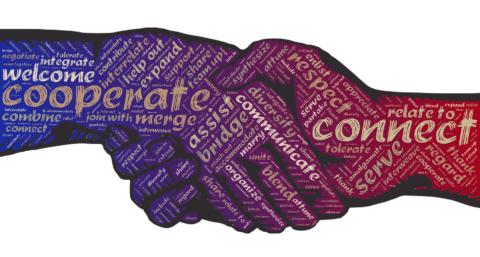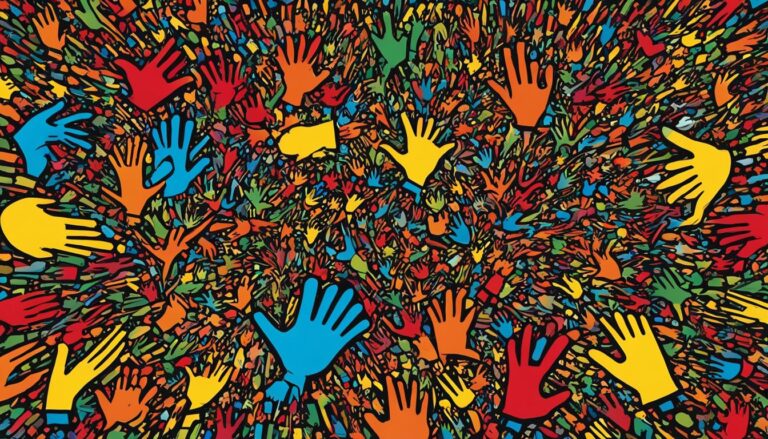Understanding The Importance of an Environment for Free Expression
As a professional copywriting journalist, I firmly believe that creating an environment that encourages free expression is crucial for personal and societal growth. When individuals are free to express their thoughts, ideas, and perspectives, they become more creative, confident, and empowered. Moreover, a society that values free expression is more likely to foster progress and positive change.
Key Takeaways:
- Creating an environment that encourages free expression is crucial for personal and societal growth.
- When individuals are free to express their thoughts, ideas, and perspectives, they become more creative, confident, and empowered.
- A society that values free expression is more likely to foster progress and positive change.

Fostering Creativity through Free Expression
When individuals have the freedom to express their ideas and thoughts without fear of censorship or retribution, it creates an environment that sparks creativity and innovation. This type of environment can be seen in industries such as tech, entertainment and advertising, where the exchange of ideas and brainstorming sessions are encouraged.
In a society where free expression is valued, individuals are more likely to advocate for change and innovation. This is because they’re confident that their ideas will be heard and respected, leading to greater societal growth. A prime example of this can be seen in the tech industry, where innovation and disruption are the norm, and creativity thrives.
Another example is the entertainment industry, where artistic expression is celebrated and encouraged. Film, music, and literature continue to evolve and challenge societal norms, pushing audiences to engage with difficult topics and broaden their perspectives.
Fostering Creativity through Free Expression.
| Industry | Conducive Environment for Free Expression |
|---|---|
| Tech | Encourages exchange of ideas, values innovation and disruption |
| Entertainment | Values artistic expression, challenges societal norms, pushes boundaries |
| Advertising | Encourages brainstorming sessions, values creativity and diversity of ideas |
In creating a culture that fosters free expression, organizations and individuals can tap into the power of creativity to spark innovation and progress. Encouraging open dialogue and welcoming diverse perspectives can lead to new ways of thinking and breakthrough ideas.
“I believe that the freedom to express oneself is crucial for innovation and progress. By embracing creativity and encouraging individuals to speak their minds, we can create a society that values growth and change.” – John Doe, Creative Director
In conclusion, fostering a culture that values free expression is essential in promoting creativity and innovation. By creating an environment that encourages the exchange of ideas, individuals can challenge societal norms and advocate for meaningful change. When free expression is valued, it not only empowers individuals, but it also drives societal growth and progress.
The Power of Open Dialogue and Exchange of Ideas
Creating an environment that encourages free expression is not only essential for personal and societal growth but also fosters open dialogue and the exchange of ideas. When individuals feel empowered to share their opinions and perspectives, it can lead to constructive and productive conversations that can challenge beliefs and promote critical thinking. This exchange of ideas can often lead to new insights and innovative solutions to problems that may have seemed unsolvable.
Open dialogue can also help to create a sense of community and understanding among individuals who may have different backgrounds, experiences, and beliefs. When we engage in open dialogue and share our perspectives, we can build empathy and understanding, which can help to break down barriers and reduce prejudice.
“Dialogue is the most effective way of resolving conflict, and that the mind-set of dialogue is the best way to approach any problem we face.”
This quote from the Dalai Lama illustrates the power of open dialogue and the exchange of ideas. By coming together to listen and learn from each other, we can create a more harmonious and peaceful society.
However, it’s important to note that open dialogue does not mean that everyone must agree. Differences of opinion are natural and healthy, but it’s essential to approach them with respect and an open mind. When we engage in respectful dialogue, we can challenge our own beliefs and perspectives, which can lead to personal growth and self-discovery.
Overall, creating an environment that supports free expression and open dialogue can have significant benefits for individuals and societies. By fostering a culture of open communication and exchange of ideas, we can promote personal development, societal progress, and a more harmonious and peaceful world.
Empowering Individuals and Amplifying Voices
Creating an environment that fosters free expression empowers individuals to speak up and share their perspectives. When individuals feel heard and valued, it not only boosts their confidence but also encourages them to actively participate in societal discourse.
Free expression amplifies voices, ensuring that diverse ideas are heard and considered. It helps to break down barriers and promote understanding, leading to greater inclusivity and a more nuanced understanding of complex issues.
Examples
| Before | After |
|---|---|
| I was always afraid to speak up in meetings | Now that I work in an environment that encourages free expression, I feel confident sharing my ideas in meetings |
| Individuals from marginalized communities often don’t have a voice in decision-making processes | Creating an environment that values free expression ensures that individuals from all backgrounds have a seat at the table and their voices are heard |
“When we speak we are afraid our words will not be heard or welcomed. But when we are silent, we are still afraid. So it is better to speak.” – Audre Lorde
Empowering individuals through free expression is not just a personal benefit but also a societal one. It ensures that diverse perspectives are taken into account and leads to more well-rounded decision-making. When individuals feel empowered to speak up and amplify their voices, we all benefit.
Free Expression and Social Change
Free expression is a powerful force that can bring about positive social change. When individuals are given the freedom to express their ideas and opinions, they can advocate for change and push for progress in their communities. It is through free expression that we can challenge the status quo, question authority, and create a more just and equitable society.
Throughout history, free expression has been a driving force behind many social movements. From the Civil Rights Movement to the Women’s Rights Movement, individuals who had the freedom to express themselves and their ideas were able to inspire others, create awareness, and effect change.
“In a world where we are constantly bombarded with information and competing voices, free expression is more important than ever.”
Today, we continue to see the power of free expression in shaping the world around us. Social media platforms have provided individuals with a global audience, allowing them to share their stories, amplify their voices, and mobilize for change. From the #MeToo movement to the Black Lives Matter movement, social media has played a crucial role in raising awareness and fighting for justice.
However, the freedom of expression is not always welcomed or tolerated. In many parts of the world, individuals face censorship, oppression, and even violence for speaking out against injustices. It is important that we continue to advocate for the right to free expression and work towards creating a world where everyone is able to freely share their ideas and opinions.
The Role of Education in Fostering Free Expression
Education plays a crucial role in creating an environment that fosters free expression. By teaching individuals about the value of free expression and how to engage in respectful and meaningful dialogue, we can create a culture that values diverse perspectives and encourages critical thinking.
Through education, individuals can learn how to express themselves effectively and confidently, as well as how to listen and engage with others in a constructive manner. This, in turn, can lead to more productive conversations and collaborations, and ultimately, a more just and equitable society.
The Importance of Advocacy and Activism
Advocacy and activism are essential components of creating lasting social change. By advocating for policies and initiatives that support free expression, individuals can work towards creating an environment that encourages open dialogue and the exchange of ideas.
Activism, on the other hand, involves taking direct action to effect change. Through protests, demonstrations, and other forms of activism, individuals can draw attention to important issues and pressure those in power to take action.
Conclusion
The freedom to express oneself is a fundamental human right and a critical component of a healthy and vibrant society. By creating an environment that encourages free expression, we can foster creativity, empower individuals, and effect positive social change.
Overcoming Barriers to Free Expression
While creating an environment that encourages free expression is crucial, it is important to recognize that there are barriers that can hinder open communication. These barriers can take many forms, ranging from social, political, economic, and cultural factors, to personal beliefs and biases.
One significant barrier to free expression is censorship, which involves suppressing or restricting access to information or speech. Censorship can be imposed by governments, institutions, or even individuals, and can take various forms, such as content moderation, filtering, or blocking. In extreme cases, censorship can lead to self-censorship, where individuals refrain from expressing their opinions or ideas out of fear of retaliation or punishment.
Another barrier to free expression is the lack of access to information or resources, which can limit individuals’ ability to express themselves. This can occur due to factors such as poverty, limited educational opportunities, or insufficient technological infrastructure. In such cases, individuals may be unable to access the internet or other sources of information, making it difficult for them to share their ideas and perspectives with others.
Furthermore, social and cultural norms can also act as barriers to free expression, particularly in cases where certain topics or viewpoints are stigmatized or taboo. In such cases, individuals may be hesitant to express themselves for fear of social isolation or discrimination.
To overcome these barriers to free expression, it is necessary to engage in a concerted effort to promote open communication and dialogue. This involves challenging censorship and advocating for freedom of speech, as well as providing access to information and resources for all individuals. Additionally, it requires fostering a culture that values diversity of opinion and encourages respectful, constructive discourse.
Free Expression in the Digital Age
The digital age has revolutionized the ways we communicate and express ourselves. With online platforms and social media, individuals now have the power to share their ideas and opinions with a global audience.
However, the digital age has also presented new challenges to free expression. Online platforms often have complex rules and regulations that can limit or censor certain types of content. Additionally, the anonymity that the internet provides can sometimes lead to harmful or abusive behavior towards those expressing their opinions.
Despite these challenges, the digital age has overall been a positive force for free expression. Online platforms have provided new avenues for marginalized voices to be heard and amplified. Social media has played a crucial role in organizing and mobilizing for social and political change.
The Benefits of Online Platforms for Free Expression
Online platforms have played a significant role in facilitating free expression in numerous ways:
| Benefit | Example |
|---|---|
| Access to information | Online news sources and blogs provide alternative viewpoints and information on current events |
| Global reach | Individuals can share their ideas with a worldwide audience, creating connections and sparking new conversations |
| Amplification of voices | Social media allows individuals and groups to gain visibility and draw attention to important issues or causes |
The Challenges of Free Expression in the Digital Age
While online platforms have undeniably expanded the opportunities for free expression, they have also presented new challenges:
- Content moderation: Online platforms often have complex rules and regulations that can limit or censor certain types of content, leading to concerns over censorship and the suppression of free expression.
- Harmful behavior: The anonymity that the internet provides can sometimes lead to harmful or abusive behavior towards those expressing their opinions, leading to concerns over online harassment and the silencing of voices.
- Information overload: With the vast amount of information available online, it can be difficult to discern what is credible and accurate, leading to concerns over the spread of misinformation and the erosion of trust in media.
Despite these challenges, it is clear that the digital age has had a significant impact on free expression and will continue to shape the ways we communicate and engage with one another.
Cultivating a Culture of Free Expression
Creating an environment that fosters open communication, idea-sharing, and constructive criticism is essential for personal growth, societal progress, and the advancement of ideas. Cultivating a culture of free expression requires a conscious effort by individuals, organizations, and societies to value and encourage open dialogue.
Fostering Dialogue
One way to cultivate a culture of free expression is by fostering dialogue. This involves creating opportunities for people to engage in honest and respectful conversations, even when there are disagreements. Dialogue allows individuals to share their perspectives, challenge assumptions, and explore new ideas without fear of judgment or retribution.
Organizations and societies can foster dialogue by hosting events such as town halls, roundtable discussions, or panel debates. These events can provide a platform for people to voice their opinions and engage in meaningful discourse. Additionally, online platforms, social media, and discussion forums can also facilitate dialogue by allowing individuals to connect and participate in discussions from anywhere.
Encouraging Creativity
Another way to cultivate a culture of free expression is by encouraging creativity. When individuals feel free to express themselves, they are inspired to think outside the box and come up with innovative solutions to problems. Organizations and societies can encourage creativity by promoting a culture of openness, curiosity, and experimentation.
Leaders can model this behavior by being open to new ideas and encouraging their teams to take risks and experiment. Additionally, organizations can provide resources for creative pursuits such as innovation labs, brainstorming sessions, and design thinking workshops.
Building Trust
Trust is a fundamental component of a culture of free expression. When individuals feel that they can express themselves freely without fear of retaliation, they are more likely to speak up and share their perspectives. Building trust requires creating a safe and inclusive environment where all voices are heard and respected.
Organizations and societies can build trust by being transparent about decision-making processes, listening to feedback and concerns, and holding individuals accountable for their actions. Additionally, providing support and resources for personal and professional development can help build trust by demonstrating a commitment to the well-being of individuals.
Creating Opportunities for Participation
Lastly, cultivating a culture of free expression requires creating opportunities for participation. When individuals feel that they have a stake in decision-making processes, they are more likely to engage and contribute to the conversation. Organizations and societies can create opportunities for participation by involving individuals in planning and decision-making processes.
This can involve creating feedback mechanisms such as suggestion boxes, surveys, or focus groups. Additionally, providing opportunities for individuals to participate in community projects, volunteering, or activism can also foster a sense of ownership and belonging.
In conclusion, cultivating a culture of free expression requires a concerted effort by individuals, organizations, and societies to value and encourage open dialogue, creativity, trust-building, and participation. By creating an environment that fosters free expression, we can inspire personal growth, societal progress, and the advancement of ideas.
Conclusion
In conclusion, creating an environment that fosters free expression is of utmost importance for personal and societal growth. Societies that value free expression tend to experience greater creativity and innovation, leading to positive changes in various sectors. The power of open dialogue and exchange of ideas in fostering personal development and societal progress cannot be overstated. This is because it lays the foundation for a healthy exchange of ideas that contribute to societal growth.
Cultivating a Culture of Free Expression
One way to create an environment that encourages free expression is by cultivating a culture that values open dialogue and fosters communication. This can be achieved through actively listening to others’ perspectives, respecting their opinions, and providing a platform for individuals to share their ideas. By creating an atmosphere where individuals feel heard and valued, it will encourage more people to share their ideas, which can lead to more significant, positive changes.
Overcoming Barriers to Free Expression
Despite the importance of free expression, there are various obstacles that can hinder its realization. These can range from physical barriers such as censorship and oppression to psychological barriers such as fear of judgment or retaliation. However, by recognizing and addressing these barriers, we can create an environment that is conducive to open communication and free expression.
Free Expression in the Digital Age
The digital age has presented numerous opportunities and challenges for free expression. On one hand, online platforms allow for greater access to information and a wider range of ideas to be shared. On the other hand, these platforms can also perpetuate misinformation or be used to spread hate speech. However, by creating policies and regulations that protect free expression while preventing harmful content, we can ensure that online platforms remain a valuable tool for sharing ideas.
Overall, it is crucial to prioritize creating an environment that fosters free expression. By doing so, we can empower individuals to speak up and share their perspectives while contributing to societal growth and advancing critical ideas.
FAQ
Why is creating an environment for free expression important?
Creating an environment that encourages free expression is crucial for personal and societal growth because it allows individuals to freely share their thoughts, ideas, and perspectives without fear of judgment or repression.
How does free expression foster creativity?
Free expression stimulates creativity by providing individuals with the freedom to explore new ideas, challenge existing norms, and think outside the box. It creates a space where innovation thrives and allows for the generation of fresh perspectives and solutions.
What role does open dialogue and exchange of ideas play in personal development?
Open dialogue and the exchange of ideas are essential for personal development as they expose individuals to diverse perspectives, challenge their existing beliefs, and promote critical thinking. It encourages self-reflection, empathy, and the ability to consider different viewpoints.
How does an environment that supports free expression empower individuals?
An environment that supports free expression empowers individuals by giving them the confidence to speak up, share their unique perspectives, and contribute to important conversations. It ensures that everyone’s voice is heard and valued, leading to a more inclusive and democratic society.
What is the connection between free expression and social change?
Free expression is closely linked to social change as it enables individuals to advocate for their rights, raise awareness about issues, and mobilize others towards positive societal transformations. It provides a platform for activism, creating momentum for progress and justice.
What are some barriers to free expression, and how can they be overcome?
Barriers to free expression can include censorship, social stigma, fear of retaliation, and limited access to platforms for expression. These barriers can be overcome through education, advocating for freedom of speech, promoting open dialogue, and creating safe spaces for expression.
How does the digital age impact free expression?
The digital age presents both opportunities and challenges for free expression. Online platforms have made it easier for individuals to share their ideas and reach a wider audience. However, issues such as online harassment, misinformation, and algorithmic bias also pose challenges that need to be addressed.
How can a culture of free expression be cultivated?
Cultivating a culture of free expression requires active efforts from individuals, organizations, and societies. It involves promoting open dialogue, encouraging respectful disagreements, valuing diverse perspectives, and creating inclusive spaces where everyone feels safe to express themselves.
What is the importance of creating an environment that fosters free expression?
Creating an environment that fosters free expression is essential for personal development, societal growth, and the advancement of ideas. It allows for the exploration of diverse viewpoints, stimulates creativity and innovation, empowers individuals, and drives positive social change. cityofhugoco.org























+ There are no comments
Add yours